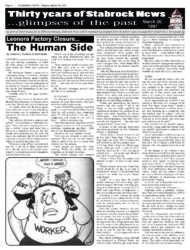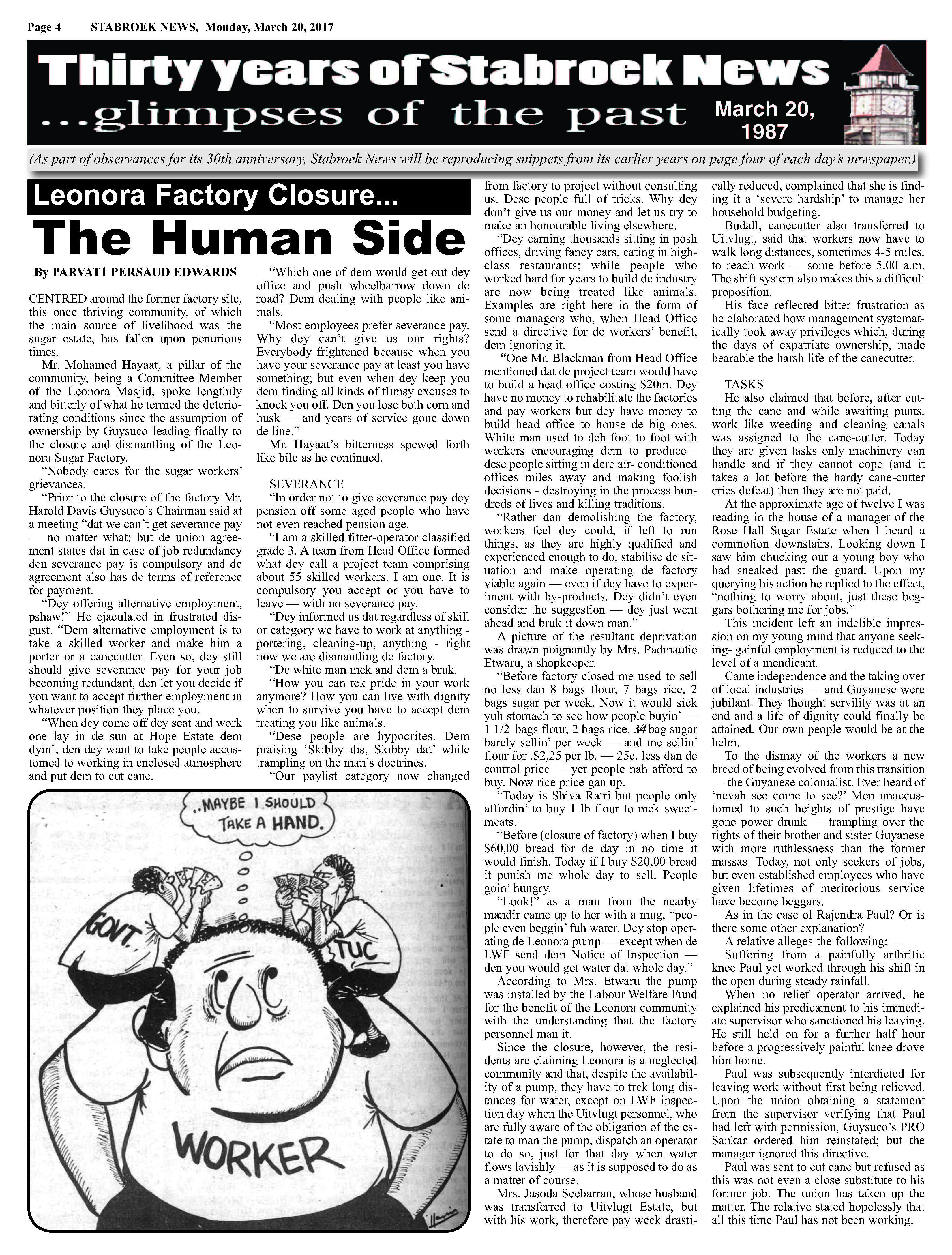The Human Side
By PARVAT1 PERSAUD EDWARDS
CENTRED around the former factory site, this once thriving community, of which the main source of livelihood was the sugar estate, has fallen upon penurious times.
Mr. Mohamed Hayaat, a pillar of the community, being a Committee Member of the Leonora Masjid, spoke lengthily and bitterly of what he termed the deteriorating conditions since the assumption of ownership by Guysuco leading finally to the closure and dismantling of the Leonora Sugar Factory.
“Nobody cares for the sugar workers’ grievances.
“Prior to the closure of the factory Mr. Harold Davis Guysuco’s Chairman said at a meeting “dat we can’t get severance pay — no matter what: but de union agreement states dat in case of job redundancy den severance pay is compulsory and de agreement also has de terms of reference for payment.
“Dey offering alternative employment, pshaw!” He ejaculated in frustrated disgust. “Dem alternative employment is to take a skilled worker and make him a porter or a canecutter. Even so, dey still should give severance pay for your job becoming redundant, den let you decide if you want to accept further employment in whatever position they place you.
“When dey come off dey seat and work one lay in de sun at Hope Estate dem dyin’, den dey want to take people accustomed to working in enclosed atmosphere and put dem to cut cane.
“Which one of dem would get out dey office and push wheelbarrow down de road? Dem dealing with people like animals.
“Most employees prefer severance pay. Why dey can’t give us our rights? Everybody frightened because when you have your severance pay at least you have something; but even when dey keep you dem finding all kinds of flimsy excuses to knock you off. Den you lose both corn and husk — and years of service gone down de line.”
Mr. Hayaat’s bitterness spewed forth like bile as he continued.
SEVERANCE
“In order not to give severance pay dey pension off some aged people who have not even reached pension age.
“I am a skilled fitter-operator classified grade 3. A team from Head Office formed what dey call a project team comprising about 55 skilled workers. I am one. It is compulsory you accept or you have to leave — with no severance pay.
“Dey informed us dat regardless of skill or category we have to work at anything – portering, cleaning-up, anything – right now we are dismantling de factory.
“De white man mek and dem a bruk.
“How you can tek pride in your work anymore? How you can live with dignity when to survive you have to accept dem treating you like animals.
“Dese people are hypocrites. Dem praising ‘Skibby dis, Skibby dat’ while trampling on the man’s doctrines.
“Our paylist category now changed from factory to project without consulting us. Dese people full of tricks. Why dey don’t give us our money and let us try to make an honourable living elsewhere.
“Dey earning thousands sitting in posh offices, driving fancy cars, eating in high-class restaurants; while people who worked hard for years to build de industry are now being treated like animals. Examples are right here in the form of some managers who, when Head Office send a directive for de workers’ benefit, dem ignoring it.
“One Mr. Blackman from Head Office mentioned dat de project team would have to build a head office costing $20m. Dey have no money to rehabilitate the factories and pay workers but dey have money to build head office to house de big ones. White man used to deh foot to foot with workers encouraging dem to produce dese people sitting in dere air- conditioned offices miles away and making foolish decisions destroying in the process hundreds of lives and killing traditions.
“Rather dan demolishing the factory, workers feel dey could, if left to run things, as they are highly qualified and experienced enough to do, stabilise de situation and make operating de factory viable again even if dey have to experiment with by-products. Dey didn’t even consider the suggestion — dey just went ahead and bruk it down man.”
A picture of the resultant deprivation was drawn poignantly by Mrs. Padmautie Etwaru, a shopkeeper.
“Before factory closed me used to sell no less dan 8 bags flour, 7 bags rice, 2 bags sugar per week. Now it would sick yuh stomach to see how people buyin’ — 1 1/2 bags flour, 2 bags rice, 3/4 bag sugar barely sellin’ per week — and me sellin’ flour for .$2,25 per lb. — 25c. less dan de control price — yet people nah afford to buy. Now rice price gan up.
“Today is Shiva Ratri but people only affordin’ to buy 1 lb flour to mek sweet-
meats.
 “Before (closure of factory) when I buy $60,00 bread for de day in no time it would finish. Today if I buy $20,00 bread it punish me whole day to sell. People goin’ hungry.
“Before (closure of factory) when I buy $60,00 bread for de day in no time it would finish. Today if I buy $20,00 bread it punish me whole day to sell. People goin’ hungry.
“Look!” as a man from the nearby mandir came up to her with a mug, “people even beggin’ fuh water. Dey stop operating de Leonora pump — except when de LWF send dem Notice of Inspection — den you would get water dat whole day.”
According to Mrs. Etwaru the pump was installed by the Labour Welfare Fund for the benefit of the Leonora community with the understanding that the factory personnel man it.
Since the closure, however, the residents are claiming Leonora is a neglected community and that, despite the availability of a pump, they have to trek long distances for water, except on LWF inspection day when the Uitvlugt personnel, who are fully aware of the obligation of the estate to man the pump, dispatch an operator to do so, just for that day when water flows lavishly — as it is supposed to do as a matter of course.
Mrs. Jasoda Seebarran, whose husband was transferred to Uitvlugt Estate, but with his work, therefore pay week drastically reduced, complained that she is finding it a ‘severe hardship’ to manage her household budgeting.
Budall, canecutter also transferred to Uitvlugt, said that workers now have to walk long distances, sometimes 4-5 miles, to reach work — some before 5.00 a.m. The shift system also makes this a difficult proposition.
His face reflected bitter frustration as he elaborated how management systematically took away privileges which, during the days of expatriate ownership, made bearable the harsh life of the canecutter.
TASKS
He also claimed that before, after cutting the cane and while awaiting punts, work like weeding and cleaning canals was assigned to the cane-cutter. Today they are given tasks only machinery can handle and if they cannot cope (and it takes a lot before the hardy cane-cutter cries defeat) then they are not paid.
At the approximate age of twelve I was reading in the house of a manager of the Rose Hall Sugar Estate when I heard a commotion downstairs. Looking down I saw him chucking out a young boy who had sneaked past the guard. Upon my querying his action he replied to the effect, “nothing to worry about, just these beggars bothering me for jobs.”
This incident left an indelible impression on my young mind that anyone seeking- gainful employment is reduced to the level of a mendicant.
Came independence and the taking over of local industries — and Guyanese were jubilant. They thought servility was at an end and a life of dignity could finally be attained. Our own people would be at the helm.
To the dismay of the workers a new breed of being evolved from this transition — the Guyanese colonialist. Ever heard of ‘nevah see come to see?’ Men unaccustomed to such heights of prestige have gone power drunk — trampling over the rights of their brother and sister Guyanese with more ruthlessness than the former massas. Today, not only seekers of jobs, but even established employees who have given lifetimes of meritorious service have become beggars.
As in the case ol Rajendra Paul? Or is there some other explanation?
A relative alleges the following: —
Suffering from a painfully arthritic knee Paul yet worked through his shift in the open during steady rainfall.
When no relief operator arrived, he explained his predicament to his immediate supervisor who sanctioned his leaving. He still held on for a further half hour before a progressively painful knee drove him home.
Paul was subsequently interdicted for leaving work without first being relieved. Upon the union obtaining a statement from the supervisor verifying that Paul had left with permission, Guysuco’s PRO Sankar ordered him reinstated; but the manager ignored this directive.
Paul was sent to cut cane but refused as this was not even a close substitute to his former job. The union has taken up the matter. The relative stated hopelessly that all this time Paul has not been working.

